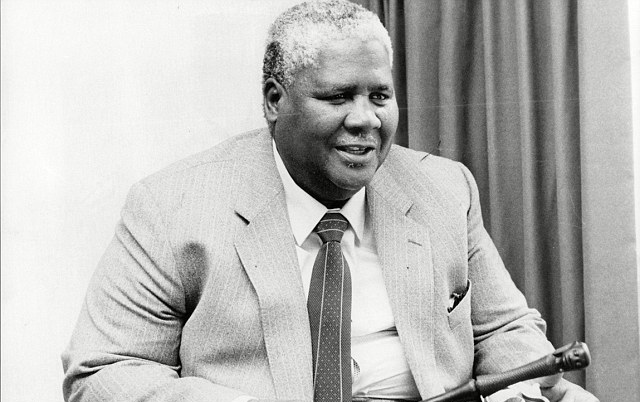Umdala Wethu . . . A Rabbi who touched no wine or strong drinks
By Gibson Mhaka
In eulogising the fallen Caesar in one of William Shakespeare’s timeless plays, ‘Julius Caesar’, Mark Antony, utters the words, “the evil that men do lives after them, and the good is often interred within their bones”.

The same can also be said or applied to the founding father of nationalism in Zimbabwe, Joshua Mqabuko Nyongolo Nkomo who died in Harare on July 1, 1999 after a long battle with prostate cancer and was buried at the national shrine on July 5, 1999.
Fondly known as Umdala Wethu, Chibwechitedza and Father Zimbabwe, Joshua Nkomo was an icon and a colossus of Zimbabwe’s political history who has come to symbolise the triumph of hope over despair, of love over hatred, and of goodness over evil.
Where his soul is, how it is and with whom it is, there is one glaring achievement which cannot be snatched away from him. When he passed on he left behind a rich legacy of nationhood, peace and unity in Zimbabwe.
In his autobiography, ‘The Story of My Life’, Dr Joshua Nkomo describes himself as a mother’s boy, writing about the very close relationship with his mother, a cook who like his father also worked for the London Missionary Society (LMS).
“I could not keep up with other children and kept running back to my mother. I adored her; I was a mother’s boy. My weakness made me backward in our games and the sport of stick fighting…Even when I went to school and found myself coming first in my classes, from Standard One to Standard Six, I felt the other boys were better than me.”
Besides being a mother’s boy Dr Joshua Nkomo was also a man of the people and that is why he was fondly known as Father Zimbabwe.
If politics is about winning people over, Dr Joshua Nkomo, as numerous other politicians have attested, was the master of the game and that is why probably his house at Number 17 Aberdeen Road in Matsheumhlope was converted into a museum in 2007 in his honour and to tell his illustrious liberation war credentials.
The museum was pioneered by the Joshua Mqabuko Nkomo National Foundation (JMNNF) and with its chief executive director being Jabulani Hadebe.
Hadebe said Dr Joshua Nkomo had at his command an irresistibly seductive cocktail that combined boundless charm borne of a vast self-confidence with inflexible principle, strategic and canniest pragmatism.
“Dr Joshua Nkomo was a larger-than-life character. He was a man of the people. He was one person that no matter his political position he would welcome everyone at his home even without making an appointment as is always the case with people of his status or nature.
“He was a man of unique character who was also visited or consulted by prophets and traditional healers who thought he was the most powerful sangoma or much-dreaded fetish Priest who possesses mystical powers to perform miracles,” said Hadebe.
It may sound foolhardy but I believe it was true that prophets and traditional healers regarded him as a powerful sangoma or much-dreaded fetish Priest because of sinister claims by some sections of society that he had magical powers that when pursued by an enemy he could change into something else and confuse his enemy.
Hadebe also described Dr Joshua Nkomo as a “rabbi” who like the Biblical John the Baptist was a lay preacher who was trained and worked for the LMS.
Turning to the museum Hadebe said for the past three years, the place has been averaging between 7 000 and 9 000 visitors mostly school children who came on organised tours from their schools.
“For the past three years in a year the museum has attracted between 7 000 and 9 000 visitors mostly school children who came on organised tours from their schools. This is because of the educational programmes we run with history teachers sensitising them on the value of the museum to their pupils,” he said.
Ten rooms of the previous main house make up the museum, including the veranda where the late Father Zimbabwe’s navy blue bullet-proof Mercedes Benz, which is still in mint condition, is parked.
Inside the house are portraits, newspaper cuttings, photographs, clothes, tools, kitchen utensils, including all movable household property that belonged to Nkomo and his late wife Joana “MaFuyana” Nkomo.
The artefacts on display vividly relay the story of Dr Nkomo’s life as a family man and a liberation war luminary, yet very few people, save for schoolchildren from in and around Bulawayo, have shown interest in visiting the place and learn about the man who dedicated his life to their freedom.
Noteworthy artefacts in the museum include a love letter that Dr Nkomo wrote to MaFuyana on 2 February 1977, telling her that he bought her a car as a present for their 23rd wedding anniversary as a way of expressing his love for her.
Dr Nkomo’s academic awards and regalia, his library, his rifles that he used during the war and his clothes among other things are also displayed in the museum. B Metro






